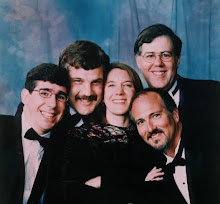St. Louis is an interesting city when it comes to opera. There is Opera Theater of St. Louis, which is the sort of international company, on a par with Santa Fe or Seattle. The orchestra is the St. Louis Symphony, the chorus are all apprentices and the singers are international stars or the next up and coming star. The odd thing about them is that they insist for some reason on performing everything in English - which I find ridiculous and artistically indefensible. They perform in the summer - May/June to be exact. Then there is Union Avenue Opera which is like a really excellent regional company. They perform in a church and their programming is really interesting (see below for my review of their August production of "Das Rheingold!"). They perform three operas from about April/May through August. Then that leaves September through March with no opera. Not to worry - Winter Opera St. Louis is ready to step into the void. They perform three operas - in 2012 "The Mikado" in November; "The Ballad of Baby Doe" in February, and finally "Tosca" in March. I first heard about them last summer as they took their spring Boheme on the road and produced it as part of the Southern Illinois Music Festival in the Carbondale area. They did a good job and as I am a great Gilbert and Sullivan fan and, even more than that, I ADORE "Baby Doe" I decided to check out them during their season. And I am glad I did.
Their "Mikado" was excellent! The principals were all outstanding; the chorus was amazing and the orchestra excellent. The staging was clever and the sets and costumes were beautiful and sumptuous. There was a weak link in my view and that was the conducting, but more about that later. First I want to ring out my praise on the cast. All of them were excellent, but Lindsay Anderson as Katisha was terrific! What a wonderful, powerful voice and commanding stage presence! I can hardy wait for her Augusta Tabor in "Baby Doe." I also loved Isaiah Bell as Nanki-Poo, Gary Moss as Poo-Bah, Kathleen Jasinskas as Yum-Yum, Lane Johnson as Ko-Ko, John Stephens as the Mikado and Erin Haupt as Pitti-Sing. And I have call attention to possibly THE best Pish-Tush I have ever seen (and I have seen a lot). Edward Hanlon was amazing. How many times have we heard this role performed by weak singers or actors - not here. Hanlon has a wonderful, rich bass voice - but he also has range and power. I have never heard "Out Great Mikado..." sung with such power and artistry. His acting was also outstanding. And there was no need to bring in someone else to perform as Go-To in the Act II madrigal "Glady Dawns." Edward Hanlon was able to handle this line with no difficulty and the quartet was sublimely beautiful (but why have the cello double Pish-Tush? Not Necessary!). I want to also say that the relatively small chorus had a wonderful sound - bravo to the chorusmaster and the singers in the chorus! And lastly, I always worry about the orchestra, but from the first note - which was in tune - the orchestra showed itself to a fine ensemble.
The weakest link in the production was, I am sorry to say, the conductor, I am sorry to say. The tempi were slow, slow, slow. In fact if felt to me as though the orchestra actually slowed down in many instances. All of the coordination problems between the pit and the stage were due to slow tempi and a conductor who did not lead but simply reacted. I listened carefully and it was obvious to me that none of the singers were rushing. A great example of this dragging reactive conducting problem occurred in the first act finale when Katisha sings her beautiful "The Hour of Gladness," the orchestra was behind her throughout and it was not the singers fault! The tempo on "I Am So Proud" was terribly slow. What a disappointment that there was no real patter in that song at "To Sit In Solemn Silence." I was hoping they would take an encore but instead this conductor simply slogged through one of G & S' most inspired patter ensembles at a boringly slow tempo. I could go on. Luckily the musicians on the stage and in the pit were so outstanding that they made this show work in spite of the conducting.
My other critique is with an issue that gets a lot of attention on savoy.net, and this is the issue of updating the dialog and song lyrics. In general I am of the camp that prefers Gilbert's dialog and lyrics to be performed untouched and unchanged. However, I know there are some references and jokes that just don't work anymore and I am open to tasteful alterations. And I have to say, in general, I thought this was done pretty well. John Steven's "A More Humane Mikado..." was a great example of updating at its best. He made some clever changes in the first verse which were funny and replaced the out of date references, but kept Gilbert's well-known and clever last verse in tact. Ko-Ko's "Little List Song" was a bit of a misfire. What he did was to change the words in all of the verses. This I think was a mistake. The verses were progressively less funny and the timely allusions got tiresome (we are all really tired of election stuff so the Romney/Obama jokes did not even get a chuckle from the audience!) It would have been so much better to have kept the first verse in tact, make small changes in verse two and then do a complete re-write of verse three maybe with some of the clever material from verse 1. In the dialog - most of it was kept, but there was one major misfire. Nanki-Poo is identified as a "2nd trombone" in the original and this line comes back almost a dozen times. In this production "2nd trombone" was replaced with "American Idol." It was funny maybe two times, otherwise it wasn't funny at all and the audience didn't laugh, mostly because it makes no sense. Gilbert's original would have been funnier. I will admit to laughing at Poo-Bah's replacing of the word "stockbroker" with "1 percent" in the line to Ko-Ko that he never grovels to anyone of the 1 percent (under the rank of stockbroker). It was funny. That is the kind of replacement I don't usualy like, but it worked in a way that "American Idol" simply did not (and this might have been Gary Moss' delivery which was great!).
I would have liked to have had Yum-Yum's verse in "Were you not to Ko-Ko plighted" reinstated. This is not a criticism. I just happen to like it and wish it was performed more often. I did miss "See How the Fates their Gifts Alot" which was cut (except for about 8 bars which the orchestra played as moving music.) I realize it is not Sullivan or Gilbert's most inspired song, but it does have its own charm and would like to have heard it performed if for no other reason than to give this wonderful Mikado more to sing.
Lastly, a couple of my favorite moments - the girl running across the stage throwing (and I mean throwing) rose petals right before "Defer to the Lord High Executioner." Ko-Ko and Katisha's business which build up to the line "Shrink not from me..." was hilarious. The newspapers in "A Wandering Minstrel" which was beautifully sung (this bit reminded me of Gilbert's "Trial By Jury" bit with the jurors reading newspapers while the defendant sings). Yum-Yum's "The Sun Whose Rays" was glorious. Poo-Bah's "primordial protoplasmal globual;" the conga line in "So Please You Sir..." "Our Great Mikado, Virtuous Man," Katisha's entrance! "The Criminal Cried!" And the Mikado's song were all very funny.
So, in closing - if you live in the St. Louis area, put it on your calendars to come to "Baby Doe," and "Tosca." This is an excellent company and they deserve your support. Bravo on a show well done.
Here are a couple links - picture from act II finale with Katisha in the center, Yum-Yum on her right and Nanki-Poo on her left: http://www.winteroperastl.org/wp-content/uploads/2012/11/JA9C0209.jpg
Winter Opera of St. Louis
Carmen Aldrich
8 years ago


